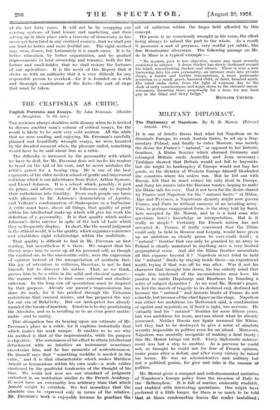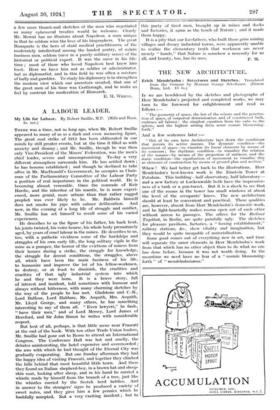MILITANT DIPLOMACY.
The Diplomacy of Napoleon. By R. B. Mowat. (Edward
Arnold. 165.) •
IT is one of Sorel's theses that what led Napoleon on to dominate Europe, to crush Austria thrice, to set up a frag- mentary Poland, and finally to enter Moscow, was merely the desire for France's "natural," as opposed to her historic, frontiers. A Rhine frontier which alarmed Germany and estranged Britain made Austerlitz and Jena necessary ; Trafalgar showed that Britain would not fall to bayonets, but she might to bankruptcy if Europe would. not buy her' goods, so the dictator of Western Europe himself blockaded the countries where his orders ran. But he fell out with Russia, felt that he must reduce his only rival in Europe, and flung his armies into the Russian wastes, hoping to make the Rhine safe for ever. Had it not been for the desire shared by France and Napoleon for the "natural limits" of Rhine, Alps and Pyrenees, a Napoleonic dynasty might now govern France, and Paris be without memory of an invading army. This, in perhaps exaggerated form, is the story told by Sorel, here accepted by Mr. Mowat, and- he is a bold man who questions Sorel's knowledge or interpretation. But is it really so simple ? Certainly the French nation has not accepted it. France, if really Convinced that the Rhine could only be held in Moscow and Leipzig, would have given' up an ambition so clearly prone to over-vault itself ; a " natural " frontier that can only be guarded by an army in Poland is clearly unnatural in anything save a very limited geographical sense. And did the Rhine frontier necessitate all this expanse beyond it ? Napoleon never tried to hold the " natural " limits by staying inside them—an experiment worth trying if that was all he was after. Was it not his character that brought him down, his too orderly mind that made him intolerant of the inconsistencies men love, his passion to outdo Hapsburgs and Bourbons by founding a series of subject dynasties ? As we read Mr. Mowat's pages, we feel the march of tragedy to its destined end, destined not because the " natural " and historic limits of France do not coincide, but because of the chief figure on the stage. Napoleon was either too ambitious (as Metternich said, a combination of egotist and nepotist) or, if Sorel is right, too nervous. He virtually had his " natural " frontier for some fifteen years, but was ambitious for more, nervous about what he already possessed. Neither Russia nor Spain menaced the Rhine, but they had to be destroyed to give a sense of absolute security impossible in politics even for an island. Moreover, Napoleon was mentally incapable of making a final treaty ; this Mr. Mowat brings out well. . Every diplomatic achieve- ment was but a step to another. As a parvenu he could, not, or thought he could not for fear of French opinion, make peace after a defeat, and after every victory he raised his terms. He was an administrative and military but not a political genius, for give and take is the essence of politics.
Mr. Mowat gives a compact and well-documented narrative of Napoleon's foreign policy from the invasion of Italy to the 'Bellerophon.' It is full of matter, eminently readable, and studded with interesting quotations. One might have preferred it a little longer, for there is so much to be told that at times condensation leaves the reader tantalized ;
a few more thumb-nail sketches of the men who negotiated so many ephemeral treaties would be welcome. Clearly Mr. Mowat has no illusions about Napoleon, a man unique in that he seldom wins the love of his biographers. The great Bonaparte is the hero of staid medical practitioners, of the moderately intellectual among the landed gentry, of sedate business men, seldom (save in a purely military sense) of the historical or political expert. It was the same in his life- time ; most of those who loved Napoleon best knew him least. Here we have him not as soldier or. administrator, but as diplomatist, and in this field he was often a mixture of bully and gambler. To study his diplomacy is to strengthen the modern view which our ancestors scouted, that one of the great men of his time was Castlereagh, and to make us feel by contrast the modulation of Bismarck.
E. M. Witoxe.



































 Previous page
Previous page